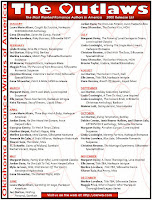. : Recent Posts : .
February 2009 OKRWA Newsblog
OKRWA June 2008 Newsletter
OKRWA May 2008 Newsletter
OKRWA April 2008 Newsletter
OKRWA March 2008 Newsletter
OKRWA February 2008 Newsletter
OKRWA January 2008 Newsletter
OKRWA December 2007 Newsletter
OKRWA November 2007 Newsletter
OKRWA October 2007 Newsletter
. : Archives : .
09/2005
10/2005
11/2005
12/2005
02/2006
03/2006
04/2006
05/2006
06/2006
07/2006
08/2006
09/2006
10/2006
11/2006
12/2006
02/2007
03/2007
04/2007
05/2007
06/2007
07/2007
08/2007
09/2007
10/2007
11/2007
12/2007
01/2008
02/2008
03/2008
04/2008
05/2008
06/2008
01/2009
. : 2008 Releases: .
. : Links : .
. : RWA: .
. : Credits : .
Powered by: Blogger
. : Contests: .

October 03, 2006
OKRWA October 2006 Newsletter
Happy Halloween from the Outlaws!
From the Prez, Deborah Behrens:
The Bait, the Hook, the Catch
A Recap of Christie Ridgway’s Workshop at RWA Nationals 2006
The Bait—the very beginning
First 2 pages are the most important
Where do you start a story?
· The moment when the trouble begins
· The moment things go a rye for your character
· The moment when they don’t know how to return things to normal.
· The moment of change.
· That breath before the journey begins.
Ask yourself what creates the need for the character arc?
The positive move in becoming a better person is not about love, it’s about character change. The reward is love
This doesn’t necessarily mean you go from bad to good
The potential pitfalls of prologues
· They are often back-story. Can you find a way to show it in the present?
· Don’t use flashbacks. Readers are interested in how the character is affected today not in the past
· Consider using a real time inciting incident
· Show through actions not through memory
If you choose to do them—do them carefully
You don’t have to reveal everything in the beginning, save some things for later
· Past event that had shaped him or her–that requires change or transformation
· Screenwriter Michael Hauge calls it the killer share—the moment where the character tells someone else his pain during the course of the book
The inciting incident
· Murder
· New chance at life
· First man she ever wanted to see again
· Heroine tells best friend she’s pregnant by the husband who just left her
· Heroine is forced to marry someone
· A question that needs to be answered
· Vivid exciting physical situation
There is need to restore balance. The steps to achieve that balance become your story
Robert McKee says, “This incident should be dynamic, fully developed, not vague or static.”
Never forget who your audience is…Different beginnings work for different kinds of fiction
First lines
Intrigue factor—is there a moment that makes us wonder what’s going to happen first?
Make each sentence captivating
Ask your critique group to read your first page. Is your opening sentence in the first paragraph, but not the first sentence?
If you can make each sentence of your first two pages that portray your inciting incident captivating, then you have your bait
Setting the Hook
You must make the reader care about the people involved
You must make the reader identify with them. Like stepping in a puddle on the way to a first date or running into an old flame
What about this character is like the reader
You need some sort of realism—vulnerability
5 ways to create reader identification
Create Sympathy—make the hero/heroine the recipient of undo tragedy—bad circumstances
Put your characters in jeopardy—even the danger of humiliation
Show a character as good or kind-hearted
We also identify with characters who make us laugh
Make your character powerful—superpower, beauty
Make your readers care about them through characterization
Use two of five techniques in the first ten percent of the story
4 ways to give dimension to stereotypes.
Philosophy—what the character believes in—core values. Family first, my word is golden…etc
Attitude—the way the character approaches life. Are they cynical, happy-go-lucky or down right optimistic? Tell the reader this as soon as you can
Decisions—real people don’t just react, they weigh choices and decide how to act. If a decision is easy there is no conflict and nothing for the reader to get involved in
Emotional Response—why does something affect a character? Does it remind them of something? Here is where you can use your deep POV
Other techniques in openings:
Telescoping—start with a wide angle lens then keep zooming until you get into the characters skin
Use an article –newspaper, tabloid, etc. To tell the reader about your character
The Catch—reeling the reader into the rest of the story
The catch is about conflict and you must get it on the page
Hint what the characters goal is—the character may not have any idea how they’re going to get their balance back, but there must be a visible goal
You must have visible, measurable Goals
4 types of goals:
· Win something
· Stop something
· Retrieve something
· Escape something
Darkest moment of the book is usually the opposite of the goal
What’s getting in the way? Make sure you have obstacles
Show sense of obstacles in the way of the goal
Go on an inner journey
Find one’s destiny
To be fulfilled
Need to achieve self-worth
Need to feel better about one’s self
Fully realize who one is
They’re all really about identity
Your character must grow
Always looking for ways to give the reader
More to measure
More to worry about
More reasons to turn those pages
The last line of chapter one should make you want to read more, just as the first line of chapter one did
Check Your Work:
Read just the first chapter of 3 or 4 books and look for what the author has hinted at. What’s spelled out. What’s revealed as far as the character’s goals and inner journeys
Then read your first chapter and see what’s lacking
Remember what Carrie Feron, Vice President and Editorial Director of Avon Books, said, “You have two pages. Work hard on them, so they will work hard for you.”
That’s my take…Deb
October 2006 Program:

October is paranormal month and in keeping with that theme, OK RWA will host a Wicca speaker. Now, some of you may be thinking, “Wicca? I’ve got furniture made of that.” Au contraire, mon ami. We are talking about witches and their ritual practices.
Catherine Kerley is a member of the Chalice Council for Chalice Circle CUUPs—(Covenant of Unitarian Universalist Pagans) in Norman, OK. She’s been an active member since 1997. She is also a Reiki Master, a Quantum Touch Practitioner, and has been initiated as a First Degree Georgian, a long standing Wicca tradition.
Join us for a little mind bending experience and conjure up a plot or two.
Meeting room in Penn Square Mall
October 21, 2006
1:00 P.M.
Promotion News:
Cyn Marolt will be a debut author featured at KILLERYEAR.COM - Class of 2008. Check out their website at http://www.killeryear.com/. This is a great opportunity for author cross promotion, but there’s more.
The International Thriller Writers board of directors unanimously voted to adopt the debut authors of Killer Year, promote them at Thrillerfest each year, and offered a mentorship program too. Instead of the classmates asking for cover blurbs and reviews, ITW will ask for them. And each of the debut books will be reviewed by an ITW star and featured in the ITW Thriller Reader's Newsletter. Plus, an ITW author will mentor each debut author, guiding them through their baptism by fire into the publishing world.
Lee Child, Jeff Deaver, Tess Gerritsen, Gayle Lynds, David Morrell, Jim Rollins, Anne Frasier, Douglas Clegg, Duane Swierczynski, Cornelia Read, Harley Jane Kozak, Allison Brennan, Ken Bruen and Joe R. Lansdale have all signed on as mentors. (Each Killer Year author requested their mentors.)
In addition, ITW will sponsor a Killer Year breakfast at ThrillerFest where each of the debut novelists will be presented by his or her mentor to readers, reviewers and the press. After 2007, Killer Year will remain an ongoing program, with ITW welcoming a new class of debut novelists.
Cyn owes this opportunity to best-selling author Allison Brennan who got her hooked into Killer Year. After reading a contest entry for Cyn’s Crossing the Line, Allison made a point to reach out. She's generously slipped into an informal mentorship role, offering a cover quote as well.
Ten Writing Resources Every Fiction Writer Should Have on Their Bookshelf
By Stacy Verdick Case
The Career Novelist – Donald Maass
This book is a primer for anyone serious about pursuing a writing career. Covers everything from creation to publication.
GMC: Goal, Motivation, and Conflict – Debra Dixon
If you don’t have this book, drop everything and get a copy. GMC is the building blocks of all good fiction and Deb Dixon shows you how to stack the blocks like an expert.
Story – Robert McKee
Technically, this book is for screenwriters, but it does a great job of breaking down all the elements of good story. This text uses movie examples, which makes the lessons accessible to everyone.
Self-Editing for the Fiction Writer: How to Edit Yourself Into Print – Browne and King
The self-editing book of choice because it covers what’s relevant to fiction writers, including redundancy, show vs. tell, POV, voice, and sophistication.
On Writing – Stephen King
Part memoir and part writing guide. Stephen King’s easy style and rich story telling ability makes this the non-manual, writing manual.
Writing the Breakout Novel – Donald Maass
Observations on what it takes to push the average writer into the stratosphere. Great tips on upping the ante in your own work.
Ten Percent of Nothing: The Case of the Literary Agent From Hell – Fisher
Every aspiring writer should read this book. Not every agent has your best interest at heart. Presents a real world case of what happens when writers ignore the warning signs.
Dojo Wisdom for Writers – Jennifer Lawler
A different approach to the “writers-life” book. Includes exercises to help overcome fears and blocks that might be holding you back.
The Synonym Finder – J.I. Rodale
Better than any thesaurus ever written.
Snoopy’s Guide to the Writing Life – Edited by Barnaby Conrad and Monte Schultz
This book is indispensable! Yes, it includes tips from some well-known authors, but its best asset is a good laugh. This business is tough, a little humor can help get through the rough spots.
~~~~~~~~~~~~~~~
Stacy Verdick Case is the owner of idothewritething.com a store that offers quality custom designed products for writers of all genres. Stacy invites you to visit her store and sign up for her free monthly ezine that offers writing tips to help keep you on track.
Article Source: http://EzineArticles.com/?expert=Stacy_Verdick_Case
Editor's Note:
I would love to see all member news! Contest finals, wins, contracts, new releases, finished manuscripts,etc... If you have an article to share, it is more than welcome. If you have a new release, forward the blurb along with your website to me. Please email me by the 1st of the month to get it into the newsletter. Thanks! RElliott4@aol.com

